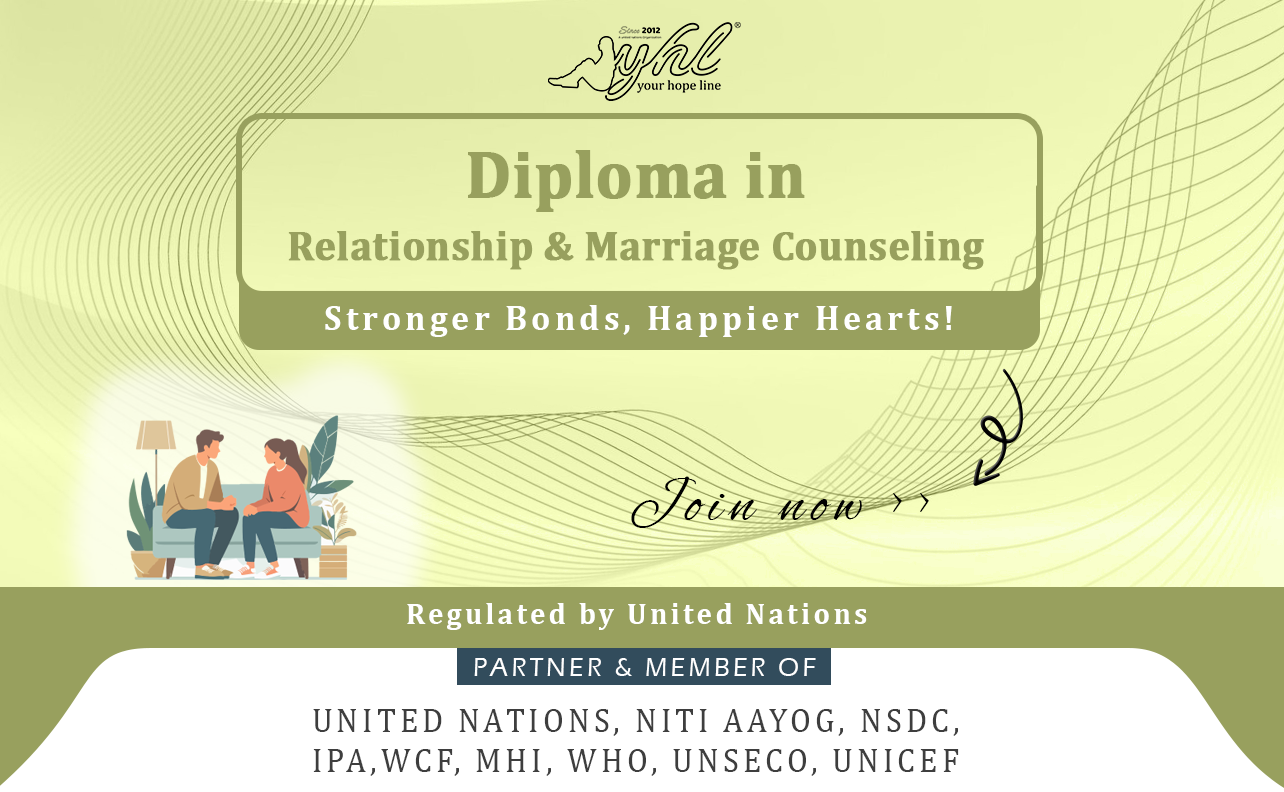
Diploma in relationship & marriage counseling – Your Hope Line
United Nations Recognized | Niti Aayog Recognized | ISO 29993:2017

United Nations Recognized

Niti Ayog Recognized

ISO
29993:2017
29993:2017

Registration Card – Available

Duration – Fexible

Printed Notes – Available

Certificate on Merit – not available

Community Access – Lifetime

Payment Mode – One time
- Duration : 6 months
- Mode : Self-Placed
- Price : ₹15,000
₹20,000 - CoM : not available
Relationship & Marriage
- 1. What is Relationship
- 2. Types of Relationship
- 3. Dynamics of Relationship
- 4. Relationship Counseling
- 5. Approaches & Exploration of Relationship Counseling
- 6. Types of Assessment Used
- 7. Activities to resolve conflicts
- 8. Problem Solving Session
- 9. Marital Adjustment Scale
- 10. Conflicts in Relationship
- 11. Barriers in Communication
- 12. Conduction of Counseling Session
- 13. Research in Relationship Counseling
- 14. Techniques to resolve conflicts
- 15. Stages & Goals of Relationship Therapy
- 16. Initial contact versus the intervention
- 17. Case Studies
- 18. Perception of Relationship
- 19. Phases of Relationship
- 20. Components of Relationship
- 21. Code of Conduct Formula
- 22. Reflection Therapy
- 23. Association Therapy
- 24. Separation Therapy
- 25. Psychology of Relationship
- 26. 4 Golden words in Relationship
- 27. Session Strategy
- 28. Counseling Pitch
- 29. Understanding the dynamics of relationships and the stages of marriage
- 30. Communication skills and conflict resolution technique
- 31. Intimacy and sexual issues
- 32. Cultural and diversity considerations
- 33. Family of origin and how it affects the relationship
- 34. Family Dynamics and individual differences
- 35. Trauma and its impact on the relationship
- 36. Therapies involved in the area of marital Counseling
- 37. Ethics and legal considerations
- 38. Techniques for working with couples in crisis
- 39. Assessment and treatment planning
- 40. Practice management and building a successful private practice
- 41. Basics of Counseling Skills
- 42. Role of a Marriage Counselor
- 43. Qualifications of a Marriage Counselor
- 44. Complications in Marital Counseling
- 45. Emotional Intelligence and its role in Marital Counseling
Counseling Psychology
- 1. Counseling Skills
- 2. Counseling Basics
- 3. Types of Counseling
- 4. Personality of a Counselor
- 5. 3 Counseling Approaches
- 6. 5 Step Counseling Process
- 7. 12 Modern Counseling Skills
- 8. 8 Therapies Simplified
- 9. Counseling Procedure
- 10. Counseling Vs Therapy
- 11. Self Care for counselor
- 12. Online Vs Offline Counseling
- 13. Counseling Ethics & Principles
- 14. Individual Vs. Group Counseling
- 15. Self-Care
- 16. Expressive Therapies
- 17. Narrative Therapy
- 18. Crisis Intervention
- 19. Work Stress
- 20. Music Therapy
- 21. Art Therapy
- 22. Sexual Harassment
- 23. Doodling
- 24. Focus and Memory
- 25. Depression Counseling
- 26. Relationship Counseling
- 27. Anger Counseling
- 28. Addiction Counseling
- 29. Stress & Anxiety
- 30. Guilt and Regret
- 31. Behaviour Counseling
- 32. Workplace Counseling
Child Psychology & Parenting
- 1. Child Psychology Simplified
- 2. Reasons for learning child Psychology
- 3. Developmental Areas of child
- 4. Developmental Theories
- 5. Role Of Parents
- 6. Factors of Child Development
- 7. Language & Cognitive Development
- 8. Attachment Styles
- 9. Childhood Disorders
- 10. Introduction to IQ Tests
- 11. IQ tests & Applications
- 12. Child Psychopathology
- 13. Genetic & Abnormalities
- 14. Scales & Screening Tools
- 15. Child Psychotherapy
- 16. Parent Skill Training
- 17. DST & VSMS
- 18. Parenting Science
- 19. X Factor
- 20. Parenting Change
- 21. Growing with Child
- 22. Parents Report Card
- 23. Parenting Mistakes
- 24. Handling Mistakes
- 25. Having Difficult conversation with child
- 26. Practicing - Sharing, Letting go, Right expectation
- 27. Parenting Coaching
- 28. Modern Challenges & Solutions
- 29. Safe Parenting Practices